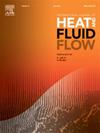Investigation on gas–liquid two-phase flow in the mixer of a liquid metal magneto-hydro-dynamic system and wavelet-based analysis
IF 2.6
3区 工程技术
Q2 ENGINEERING, MECHANICAL
International Journal of Heat and Fluid Flow
Pub Date : 2025-03-26
DOI:10.1016/j.ijheatfluidflow.2025.109819
引用次数: 0
Abstract
In this paper, turbulent elements are introduced into the mixer of a two-phase magneto-hydro-dynamic power generation system, effectively addressing the challenges of transporting high-density and high-viscosity liquid metals and inhomogeneous gas–liquid mixing. The effects of different types and numbers of turbulent elements on the gas–liquid two-phase flow pattern and phase change heat transfer are investigated using numerical simulation and wavelet multiscale analysis methods. A comprehensive evaluation index for the mixer is established, considering performance indicators such as gas–liquid mixing uniformity, friction coefficient, volumetric heat transfer coefficient, and velocity. The results indicate that the turbulent elements significantly enhance heat transfer performance, liquid metal transport velocity, and mixing uniformity. However, an increase in the number of turbulent elements also leads to an increase in the friction coefficient, particularly in the SX type mixer, where it is approximately 20% higher than that in the SK type mixer. A comprehensive analysis reveals that the overall performance of the SX mixer surpasses that of the SK mixer, with the optimal number of turbulent elements being 3 for the SX mixer and 1 for the SK mixer. Additionally, there is a clear gravity-induced stratified flow in the empty pipe mixer. The flow pattern in the SK type mixer is primarily influenced by the ratio of gravity to centrifugal force, while that in the SX type mixer is predominantly determined by gravity and the number of turbulent elements. Wavelet multiscale analysis demonstrates that the pressure fluctuations in the mixer are primarily influenced by gas–liquid interface deformation and bubble collision frequency.
液态金属磁流体动力系统混合器内气液两相流动研究及小波分析
本文将紊流元件引入两相磁流体动力发电系统的混合器中,有效解决了高密度高粘度液态金属输送和气液混合不均匀的难题。采用数值模拟和小波多尺度分析方法,研究了不同类型和数量的湍流元件对气液两相流型和相变换热的影响。综合考虑气液混合均匀性、摩擦系数、体积换热系数、速度等性能指标,建立混合器的综合评价指标。结果表明,湍流元素显著提高了传热性能、液态金属输运速度和混合均匀性。然而,湍流元素数量的增加也会导致摩擦系数的增加,特别是在SX型混合器中,其摩擦系数比SK型混合器高约20%。综合分析表明,SX混合器的整体性能优于SK混合器,SX混合器的最佳湍流元素数为3,SK混合器的最佳湍流元素数为1。此外,在空管混合器中存在明显的重力诱导分层流。SK型混合器的流型主要受重力与离心力比的影响,而SX型混合器的流型主要受重力和湍流元素数量的影响。小波多尺度分析表明,混合器内压力波动主要受气液界面变形和气泡碰撞频率的影响。
本文章由计算机程序翻译,如有差异,请以英文原文为准。
求助全文
约1分钟内获得全文
求助全文
来源期刊

International Journal of Heat and Fluid Flow
工程技术-工程:机械
CiteScore
5.00
自引率
7.70%
发文量
131
审稿时长
33 days
期刊介绍:
The International Journal of Heat and Fluid Flow welcomes high-quality original contributions on experimental, computational, and physical aspects of convective heat transfer and fluid dynamics relevant to engineering or the environment, including multiphase and microscale flows.
Papers reporting the application of these disciplines to design and development, with emphasis on new technological fields, are also welcomed. Some of these new fields include microscale electronic and mechanical systems; medical and biological systems; and thermal and flow control in both the internal and external environment.
 求助内容:
求助内容: 应助结果提醒方式:
应助结果提醒方式:


